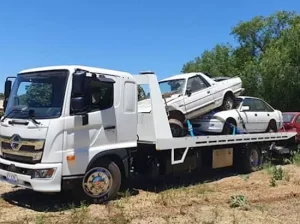
As a responsible driver, keeping your brakes in good condition is essential to ensure your and your passengers’ safety. Even with regular maintenance, brakes wear out over time and require replacement. So, when should you schedule your next brake repair service? One of the best ways to know the time is to pay attention to the signs. Common 2 signs are
- Hearing a high-pitched squeaking or grinding sound when you press the brake pedal. It’s a clear indication that the brake pads are worn out and need to be replaced.
- Brakes are less responsive or your car takes longer to stop.
These symptoms indicate worn-out brake pads, a leaking brake fluid line, or a faulty brake master cylinder, all of which require immediate attention.
Apart from signs, flow the manufacturer’s recommendations. Most automakers recommend replacing every 30,000-60,000 miles, depending on the driving conditions and the quality of the brake pads. This range may seem broad, but the manufacturer’s recommendations are based on the typical usage of the vehicle. If you drive in stop-and-go traffic or frequently drive in hilly areas, replace your brake pads more often than highway driving. Also, if you’re unsure about the condition of your brakes, do a quick visual inspection. Look through the spokes of your wheels and you should be able to see the brake pads between the calipers and rotors. If the pad is less than a quarter-inch thick, it’s time to replace them. If you’re not sure how to do this, take your vehicle to a trusted mechanic for a full brake inspection.

Even if you are not experiencing any of the symptoms of worn-out brakes, have them inspected regularly. The frequency of these inspections depends on your driving habits and the age of your vehicle. But as a general rule, you should inspect your brakes at least once a year. During this inspection, a qualified technician for brake repair in sunrise will check the brake pads, rotors, calipers, and brake lines for signs of wear or damage. If you’re a cautious driver who doesn’t do a lot of hard braking, you can go longer than those who frequently drive in stop-and-go traffic. Neglecting regular brake inspections lead to more expensive repairs down the line, so it’s best to catch any issues early on. Driving with faulty brakes puts you and your passengers in danger and causes further damage to your vehicle. It’s always better to be safe than sorry when it comes to your brakes.








